Star Wars: Attack of the Clones: The Ultimate Essay
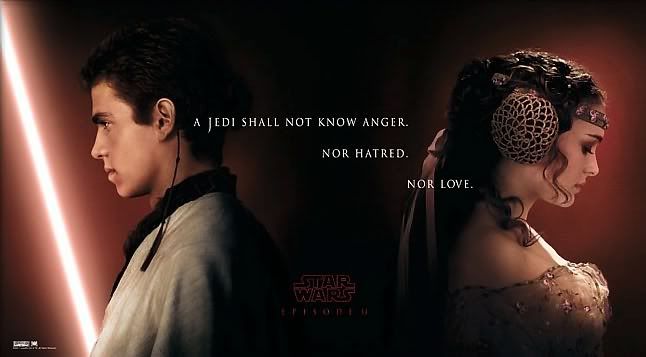
"We're keepers of the peace, not soldiers."
Civil War
A Thesis on Star Wars Episode II: Attack of the Clones
Part Five of My Ultimate (yeah, right) Analysis of the Greatest Mythology of All Time
Attack of the Clones, the second act of the Prequel Trilogy and the penultimate act of the Star Wars saga, is a brilliant combination of a love story and a film noir of political turmoil, both combined to make a brilliant treatise on human morality. Just as the plot is divided in two, so too is the Star Wars galaxy. As the galaxy cracks in two, so does human morality and the human psyche. At the center of this story is a Byronic amoral hero suffering the fate of a Shakespearean or Greek tragic hero. Anakin Skywalker will fall, and here we see what will bring about his descent into the black mask.
Attack of the Clones is a series of expectation reversals. The title itself says it all. Clones are attacking. We walk into the theater expecting the clones to be evil. And they are. They just aren't the bad guys. Even in the hands of the Jedi, perhaps because they are in the hands of the Jedi, they are the epitome of evil. A moral evil, and one that will result in the destruction and suffering of an entire galaxy. The clones themselves are the medium by which war, a war with no purpose but to give power literally to evil (Palpatine), is created. This horrific moral evil--to clone human beings simply to use them as cannon fodder--will corrupt the morality of the galaxy, resulting in its collapse.
Attack of the Clones starts with a galaxy on the brink of a Civil War. By the end of the film, the galaxy will be split in two, at war with itself. This is a perfect symbol for the split of the psyche of Anakin Skywalker (symbolizing all humanity), the split between the head and the heart [1], a split that threatens him throughout the course of Attack of the Clones and eventually will result in the utter split of his identity [2].
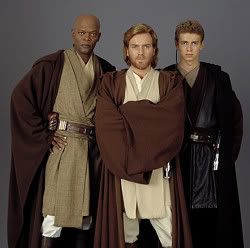
"We're keepers of the peace, not soldiers."
Sociologically, this Civil War ("The Clone Wars") is also very poignant. The Separatists, ignored and abused, want to leave the failing system of the Republic. Various businessmen, wielding massive amounts of power, pervert these needs and failings for their own desires, promoting the war [3]. The Republic, full of high ideals, refuses to let them leave, and will even resort to destroying its own system and ideals (granting Palpatine powers). Even worse, the Republic and the Jedi abandon their own principles by employing the clone army and resorting to war. And this is how the Empire will rise: two forces fighting, perverting morality, resulting in a split rather than a balance between dualities.
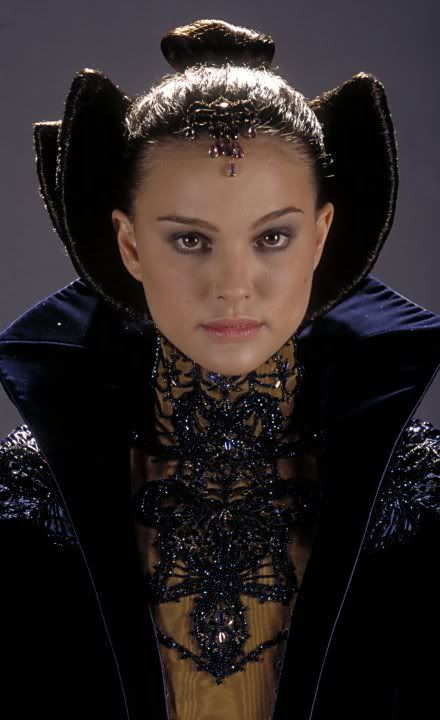
"I do not like this idea of hiding."
Padme Amidala, arriving in a ship that flips over as it comes across the screen in the first scene [4], is just as divided as her galaxy. She still uses a decoy and a secret second identity, still hiding her true self. She is still being ruled by her role as Senator. Just as Padme's decoy will be killed, her "Senator" identity will also die at the end of the film (when she marries Anakin and bares his children). The inability to embrace both sides of her dual personality will result in the death of both.
Though Padme is able to become as human as Anakin, the role of Senator is not one that she should so fully abandon. The loss of her rationale side, of her "job", is a loss of her self. And this results in tragic consequences for both her and the galaxy. In her absence, Jar-Jar votes to allow Palpatine emergency powers, effectively creating the Empire and its Emperor. When we see Padme again in Revenge of the Sith, she will have completely abandoned her role as Senator, her job, sacrificed it for the sake of her emotions and love for Anakin. She will have lost any of her power. In embracing Anakin, she has signed her own death warrant, as well as that of the Republic. For, of course, Padme represents the Republic, the female force of life and liberty. Her surrender to her emotions is the surrender of democracy, of moral codes. The failure of the Republic to do its job allows for the rise of the Empire. In Lucas' typical, brilliant cyclical logic, the failure of codes of conduct and the duty of living under a title (or job), causes the failure of the heart and the emotion, the very things that so much was sacrificed for.
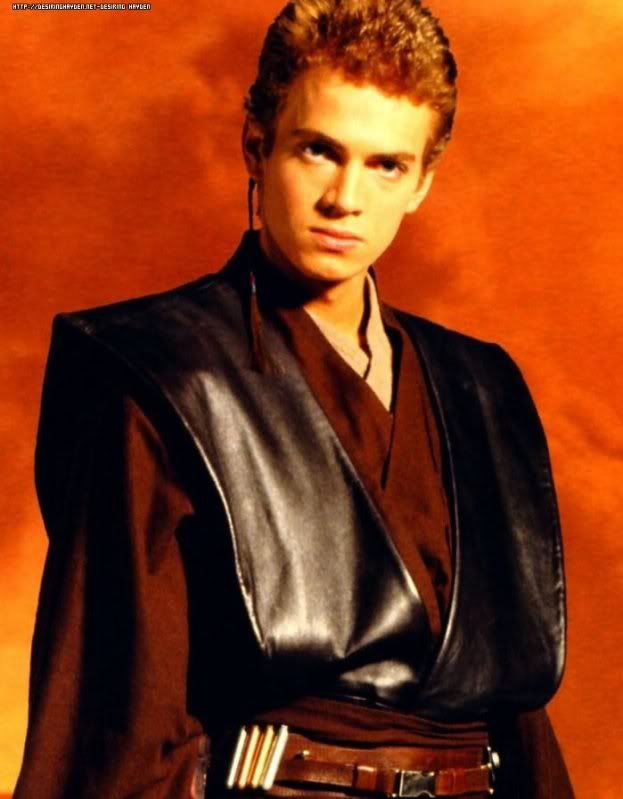
"I don't think the system works… Then they should be made to [agree]."
"By whom? Who's going to make them? You?...Sounds an awful lot like a dictatorship to me."
"Well, if it works."
Throughout Attack of the Clones, morality and the lines of good and evil are skewed and turned on their head. Anakin makes an honestly good point about the failure of democracy and the positive side of power. But we know that power corrupts, and in itself is evil. We know what power will do to the good man that was once Anakin Skywalker. Anakin will again justify his grasp for power (to recreate the world in order to make it better in his own image) once again to Padme (right before he chokes her to death) and later to his son Luke (right before he chops off his hand). Attack of the Clones explains how Anakin is so tragically destroyed by his own thirst for power, and what possibly could make a good man fall so far for his desperate struggle for power.
In fact, as the lines of morality blur and reverse, Anakin Skywalker stays at the center of the moral spectrum. He is amoral, like a Byronic hero, following his own code of morality, twisting codes to fit his own needs, justifying his actions to suit his needs. It is the world around Anakin that is in a state of reversal, changing, and falling along the moral spectrum at which he is the center. This upheavel, though, will result in his destruction. The Jedi are dissolving into the clone army that will destroy them. The Republic is turning into a dystopic dictatorship that ignores its own people. Both worlds will fall due to their own failings, and Anakin, watching it fall, forever disappointed and frustrated by this world that neglects his powers and skills and denies him exactly what it means to be human (love, a family), will take a central role in its destruction. He is the epicenter of this duality storm, of the warring moral spectrum, and of the dystopia of the Original Trilogies.
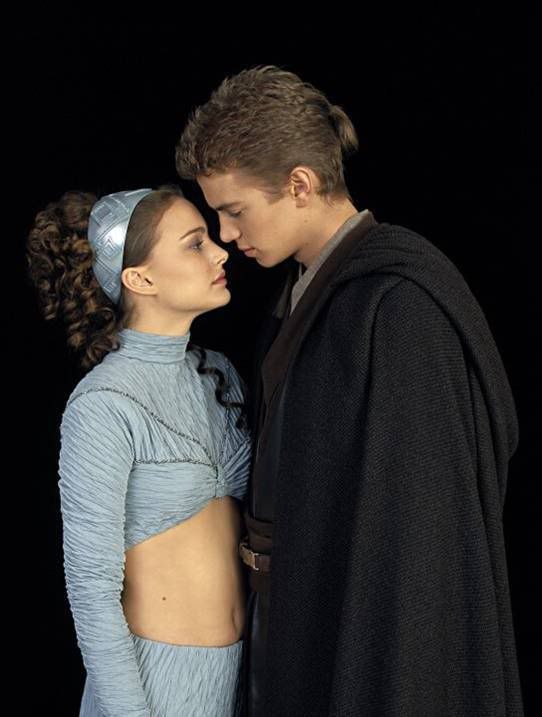
"Must be difficult, having sworn your life to the Jedi, not being able to do the things you like, or go the places you like."
"Or be with the people that I love."
"Are you allowed to love? I thought that was forbidden for a Jedi."
"Attachment is forbidden. Possession is forbidden. Compassion, which I would define as unconditional love, is central to a Jedi's life. You might say we are encouraged to love."
And thus Anakin points out both the strength of and the deep hypocrisy of the Jedi code. To love is necessary to a life of selfless service, to the life of a hero. And yet, it is denied him. Just as his Knighthood is denied to him once he desires to live a life of emotion and love, so is Anakin's humanity. Not only will this deep flaw result in the destruction of the Jedi, but it will result in the destruction of Anakin's soul. He cannot surrvive in this world that tears him apart along the moral spectrum between the head and the heart.
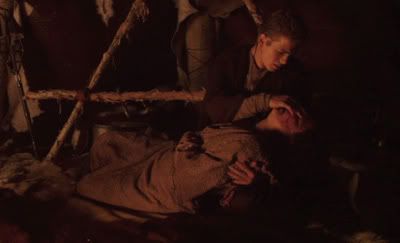
A major theme of Attack of the Clones is that of fatherhood and motherhood, a theme deeply central to the Star Wars saga. In the Original Trilogy, Luke Skywalker's journey is to become the hero that will redeem his father. In the Prequel Trilogy, Anakin Skywalker's journey is to become the villain that will be redeemed by his son. Integral to this, obviously, is Anakin's journey to becoming a father. And, therefore, so signifficant is his relationship with his own mother and the mother of his children. Shmi dies, and Padme subsequently takes the role as the maternal force. This maternal force is one that is dying with the rise of the paternal Empire. Also, there are multiple father-child pairings. Anakin twice refers to Obi-Wan as his father. Jango Fett is not only the father to Boba Fett, but also to millions of eponymous clones. Cliegg Lars, father of Owen (who, in turn, will be the adoptive father of Luke Skywalker), appears as step-father to Anakin. Bail Organa (future adoptive father of Leia Organa), also makes an appearance. And, of course, Anakin Skywalker, Darth Vader--perhaps the most famous father of all cinema--takes one giant step towards fatherhood.
Anakin has disturbing dreams of his mother, and Obi-Wan tells him to just ignore them, to ignore his attachment. This is reflective of Obi-Wan's feelings towards Anakin's developing relationship with Padme. Anakin must, according to the Jedi Code, feel no love, feel no attachment. He is not allowed to be a son, nor is he allowed to have children. The Jedi are in denial of the maternal (and parental) forces, denying attachment and love. In so denying, they also deny the life force. The bond between children and parents is fundamental to the human condition. This will be their undoing, as will be perfectly illustrated in Revenge of the Sith. And, fittingly, it will be the way in which Anakin will "bring balance to the Force". Attack of the Clones, though, concerns the dying of the female, maternal forces. While Anakin has no father, Boba Fett (like the Clone Troopers) has no mother. Anakin, the future Darth Vader (which means father in Dutch), just as he becomes a father, will destroy the last of the maternal forces in the galaxy.
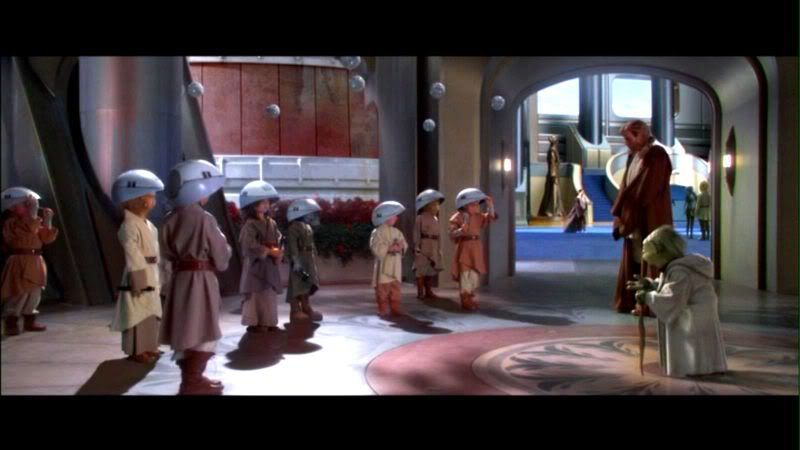
"Truly wonderful the mind of a child is."
Though Anakin has lost his childhood, children reappear in Attack of the Clones. The first child is a young boy in the Jedi library, a boy who we later will see gunned down by Clone Troopers. The arrogance of the Jedi (revealed by the librarian who refuses to believe there could be a failure of their archives), their dedication to a flawed system and inability to admit their weaknesses, is the very thing that will bring their tragic fall. This is shown again when Obi-Wan visits Yoda and the younglings. The younglings haven't completely been reprogrammed like the other Jedi, and are more able to see the truth (the flaw in the archives). This shows not only the flaw in the Jedi arrogance, but the flaw in their system of stealing children from their parents, reprogramming children and destroying their internal talents and wisdoms, destroying their feelings through an over-use of the mind. Feelings, emotions, innate abilities, the Living Force are all denied by these Jedi, and are the very things that are so strong in Anakin. This also foreshadows the ultimate revelation (the Balance being brought to the Force and the Original Trilogy) where Luke and Leia, both Force-sensitive children who had normal, happy childhoods, become the greatest heroes of them all, the powerful saviors of an entire galaxy. Their childhood wisdom stays intact, not programmed out of them.
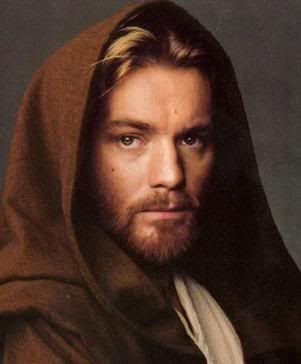
"He's like my father!"
As horrific as it is to see these children, these younglings, whom we all know will never see adulthood, but who will be murdered by Obi-Wan's own child, we must not forget the horror of seeing children in the Jedi Temple in the first place. Children wielding lightsabers, children who will never know either childhood nor their own families. And if you missed that point, I have to think that Obi-Wan, touring the clone factories on Kamino, didn't [5]. Seeing millions of little Boba Fetts being trained to be fighting machines probably reminded Obi-Wan of his own childhood. The clones are given "combat education and training programs", are "growth accelerated", given no childhood, are "totally obedient", just as the Jedi children are. The Clones and the Jedi, and their future meeting and manipulation in war, should absolutely horrify us, no matter what "good" they may do. They are an abomination of morality, nature, and humanity. In many respects, the good, noble Jedi are equally so. Just as the clones will turn on the Jedi and create the Empire, the Jedi's own denial of life, of love, of the bonds of love to create life, will be their own undoing as their humanity is erased and they are destroyed by a man that wants to save his wife and children.
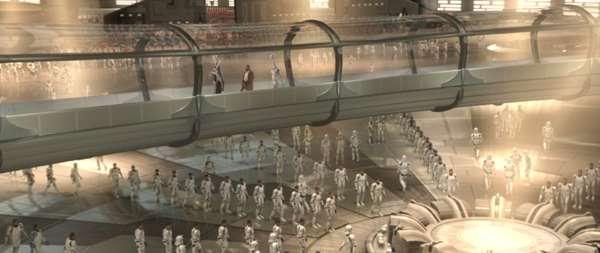
Kamino, a world of dark rain and bright white, septic light contrasts deeply with the feminine, lush, living worlds of Naboo (where Anakin and Padme's love begins to blossom). There is no life, no female forces, no fertility here. Just as Anakin already visually resembles his future self as Vader, Kamino visually resembles the Empire that will encase him. This is the birth of the Empire, and the white-suited army that will populate it. Like the Empire, Kamino is a world of visual extremes and absolutes, rather than any sort of living balance or harmony. This is the birth of the death of humanity, the birth of war.
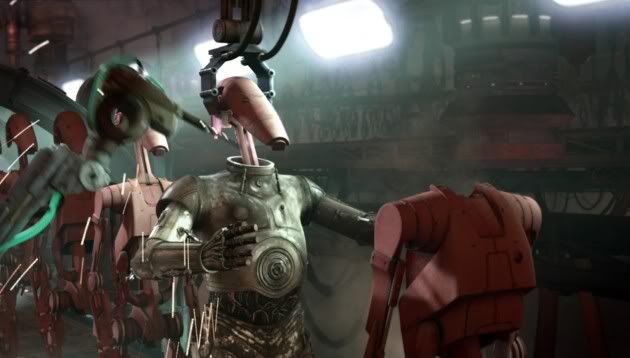
On Geonosis, our heroes encounter a droid factory, a mirror to the clone factories of Kamino, and not in the least because the products of both factories will fight on opposite sides of the catastrophic Clone Wars. Human beings and machines (both, themselves, representative of the extremes of the moral spectrum between the head and the heart) are being manufactured and manipulated for an immoral war that will result in the death of humanity, particularly that of Anakin Skywalker. As all that makes him human is destroyed in this war, he will become a machine. Again, just as the lines between morality are being blurred, the lines between humanity and machine are blurred. Darth Vader ("more machine now than man, twisted and evil") will be born of such blurring.
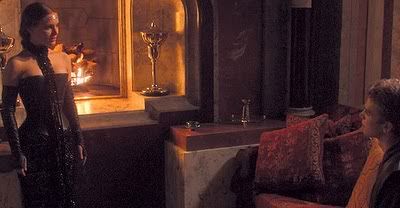
"I can't breathe."
Meanwhile, on the fertile planet of Naboo and then the sun-scorched planet of Tattooine, Padme and Anakin are getting ready to make babies of their own, babies that won't be grown in a factory (neither the bottles of Kamino nor the Jedi Temple). In a dark, fire [6]-lit room, with Padme dressed in revealing clothing, Anakin confesses his real love and feelings, making her squirm uncomfortably. Anakin says that he cannot breathe because of her, foreshadowing his future encased in a walking iron lung. Already, Anakin and Padme are suffering the pangs of forbidden love, of the denial of the self, of everything that makes us human. This denial--caused by their constrained and unbalanced world--will be their destruction.
"You are in my very soul, tormenting me."
"We live in a real world. Come back to it. I'm a Senator, you're studying to be a Jedi. If you follow your thoughts to a conclusion, it will take us to a place we cannot go. Regardless of the way we feel about each other."
"You are asking me to be rational. That is something I know I cannot do. Believe me, I wish I could just wish away my feelings. But I can't."
"We'd be living a lie…"
"No, you're right. It would destroy us."
Again, Padme and Anakin are being pulled apart by their emotions and their rational minds, torn between their titles and jobs and their own humanity and heart. Ironically, Padme says that to be true to their feelings will tear them apart, which, of course it does, but to deny them will result in the same. Fate already damns these lovers to their future course.
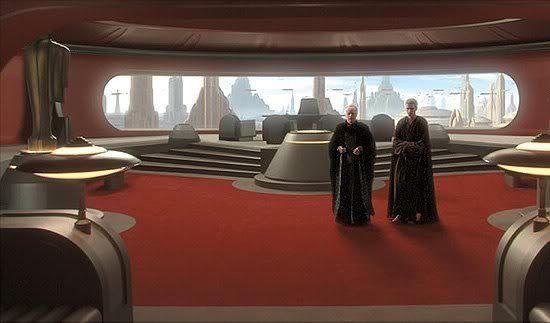
"Trust your feelings, Anakin, and then you will be invincible."
While Obi-Wan is Anakin's good (or "white" or "light") father; Palpatine is Anakin's evil (or "black" or "dark") father. While Obi-Wan is the angel on Anakin's shoulder, Palpatine is the devil on the other. While Obi-Wan tells Anakin to constrain himself, Palpatine tells him to take power and become invincible. While Obi-Wan teaches Anakin to think, Palpatine tells him to use his feelings. Because, eventually, Anakin will be unable to live his amoral life between the two, be unable find balance between these two forces, between his head and his heart, because he will fall for Palpatine's seduction, he will lose all that Obi-Wan tries to protect in him.
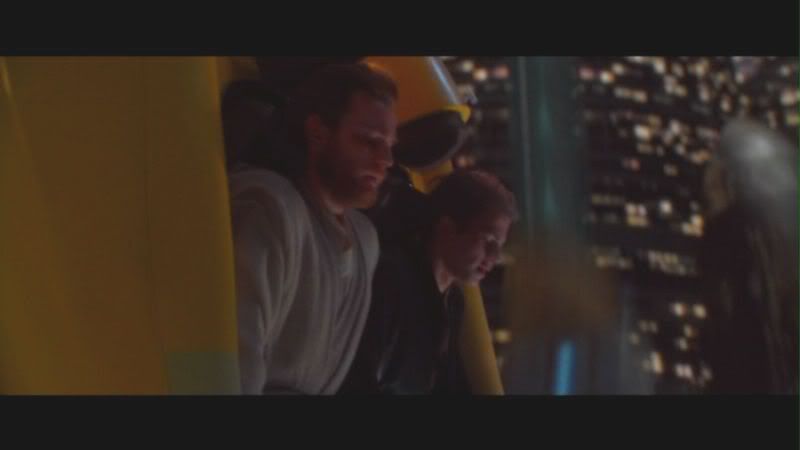
"Pull up, Anakin, pull up! …You know I don't like it when you do that… I hate it when he does that."
The film is marked with falling and rising motifs, representing the falling and rising of the characters along the tragic hero arch [7]. It begins with Anakin and Obi-Wan rising to Padme's apartment, which they will shortly fall out of at the beginning of one of the most bad ass chase scenes ever. Obi-Wan jumps out of the apartment, clinging to a droid. When it is shot out of his hands, Anakin must save him. The dependence of the Master upon the student (and vice versa) is at play throughout the film, and it represents how the fates of Anakin Skywalker and Obi-Wan Kenobi are so deeply, intrinsically linked. After Obi-Wan lectures Anakin on his recklessness (both his free falling and his feeling rather than thinking), Anakin jumps out of the speeder, doing both. This foreshadows Anakin's eventual abandonment of Obi-Wan's teachings, of the Jedi Code of restraint, and his abandon to emotion which will bring about his fall. Because of this, Obi-Wan himself will fall.
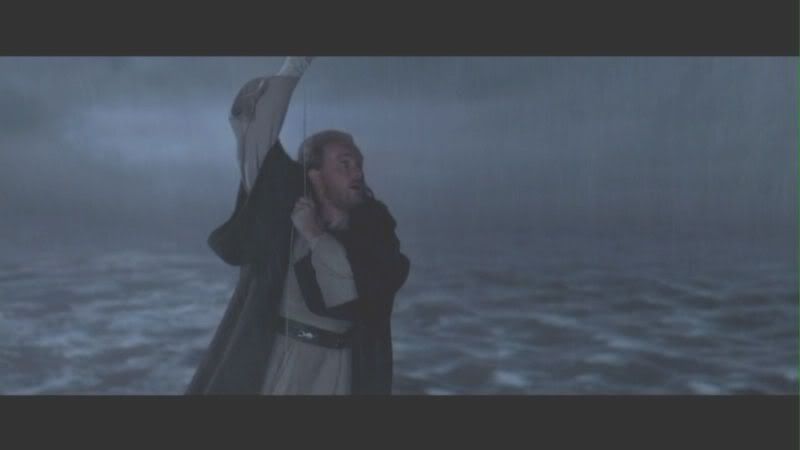
Obi-Wan's greatest fall in Attack of the Clones comes during his battle with Jango Fett. After being tied involuntarily to his adversary, just as he is to Anakin Skywalker, Obi-Wan kicks him over the edge, just as he will to Anakin Skywalker. [8] Then he realizes what he has done ("Oh no, not good."), and falls with Jango, dragged into the tragic fall. Then, Obi-Wan uses the very rope that bound him [9] as a way of rising back. Only when Jango rises back to the top, does Obi-Wan [10]. This is very symbolic of Obi-Wan's own tragic fall at the hands of his apprentice. ( I've written about this before.)
Anakin's greatest fall happens at about the same point in the film. Rejected by Padme, Anakin cannot ignore the dreams of his mother, so he returns to his roasting hot planet, the planet of love and his family. This is a dangerous planet of emotion overruling moral codes and restrictions of the mind. Anakin meets Owen, a mirror of himself: a simple farmer with a lover, mother, father, and who will also be the adoptive father of Anakin's son [11]. But this is a life that neither Anakin nor his son will be able to live, as they are destined to be heroes far from this desolate planet. Just as C3PO is now encased in metal, Anakin, by the end of the film, will also become encased partially in metal. Anakin's shadow, as he embraces Padme, resembles his future silhouette, revealing that--as he flies off into the blaring red setting sun--he is turning into Darth Vader by abandoning the Jedi code. Anakin jumps down into the Tusken Raider camp, literally falling out of the heavens. Here, he will be tested. And he will fail in every possible way.
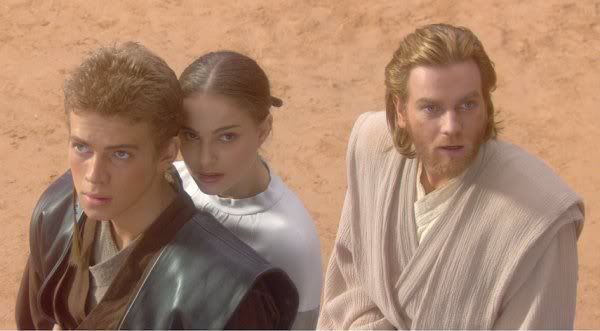
"Machines building machines, how perverse."
On Geonosis, Anakin and Padme fall into the droid factory, showing how their fates are now intricately linked. Just as Anakin will be consumed by the machines, so, too, will Padme. Because of her, he will fall. Padme is dressed in white, revealing her innocence and angelic quality. Anakin becomes trapped in the machine, his arm--the very arm that he will lose and will become robotic at the end of the film--encased in metal, his lightsaber lost. C3PO is dismembered/decapitated, and split between his elite, serving head and a battle droid. This mirrors exactly what is happening to the Jedi and the Republic. Falls create dismemberment, of both the body and the mind, a split in the heart and the head.
"Don't let your personal feeling get in the way. We have a job to do." "I don't care."
Padme falls out of the transport, and Anakin is for the first time forced to chose between his love (heart) and his job (head). Thus, Padme's fall is Anakin's fall. But, when Anakin is forced to think like her (and Obi-Wan, appropriately), he chooses the right path: self sacrifice for the greater good. Later, he will not be able to make such a decision. He will be ruled, no longer by Obi-Wan or Padme, but by Palpatine.
A similar motif in the film is one of dragging. Obi-Wan is dragged by a rope by Jango Fett. Anakin is dragged by his chains in the Geonosis arena. Being tied to another, being dragged forcibly forward, is the perfect image for these tragic characters being forced to face their fate. They are tied to forces beyond themselves, and, more importantly, tied to each other.
Anakin's moral fall follows shortly his fall from the heavenly cliffs above the Tusken Raider camp. Anakin's mother dies in his arms. In being powerless to stop her death, especially when he has so much power [12], causes Anakin to literally lose it. Here is born his desire to stop death, a desire that will totally fuck him up. When Padme (always a mirror to his mother, as female figures of his heart) is in danger of dying, Anakin will grasp power so desperately that he will lose his humanity, falling in the literary, tragic sense. To be motivated by love, to have the desire to save people, both are good. But, the inability to stop oneself, the desire for revenge, the desire to stop death, is evil, and just as unnatural as living without love or without creating new life. Love turns to grief, which turns to hatred and anger. Such is the message of the need for balance between the head and the heart.
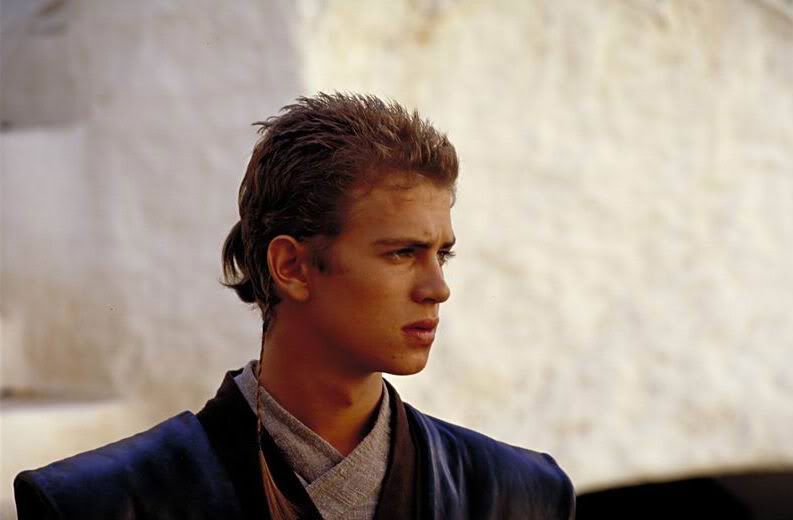
"Life seems so much simpler when you're fixing things. I'm good at fixing things. Always was. But I couldn't. Why'd she have to die? Why couldn't I save her? I know I could have."
"Sometimes there are things no one can fix. You're not all powerful, Ani."
"Well, I should be. Someday, I will be the most powerful Jedi ever. I will even learn to stop people from dying."
"To be angry is to be human."
"I'm a Jedi. I know I'm better than this."
Living by the Jedi Code has resulted in the loss of his mother and therefore part of his soul and humanity, as well as results in his loss of Padme. Anakin doesn't understand that real power means to give up power. This is ultimately what will totally unhinge Anakin: his grief and his desire to do good, his inability to control everything, his inability to get what he desires (love and to save those he loves). How absolutely real and understandable and human is this? And yet, as much as we can understand Anakin, we are equally horrified by him. As he is with himself. He feels the utter horror and guilt of his own actions, of killing "the women and the children, too", which he will later repeat within the Jedi Temple itself, as he forever, tragically and horrifically destroys the Code itself as well as his own soul. Anakin strives to be a Jedi, "better than [human]". How is that possible? How should it be possible? The Jedi code could save him from destruction, but there are fundamental problems with striving to be super-human, to deny one's humanity. The Code itself denies humanity, and therefore it is not surprising that it destroys Anakin.
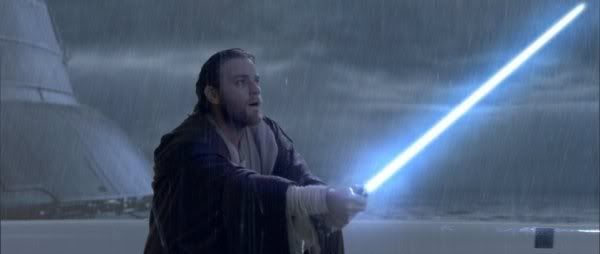
"Patience. Use the Force. Think. …Next time, try not to lose it. This weapon is your life."
Another motif of Attack of the Clones is the constant loss of one's lightsaber. Anakin loses his during the speeder chase, and Obi-Wan catches it out of the air. This mirrors Obi-Wan picking up Anakin's lightsaber after their battle on Mustafar. The lightsaber is a symbol of Anakin's good side [13] as a Jedi, and Obi-Wan Kenobi is the keeper of this side of Anakin's soul. And, in preserving his soul, Obi-Wan's role is to force Anakin to think, to restrain himself. The lightsaber symbolizes the very best of the civilized, honorable, wise, compassionate Jedi. In losing his lightsaber, Anakin loses this side of himself. [14]
Dismemberment, though an overall motif of the Star Wars saga, ramps up to extremes during Attack of the Clones. By the end, we have one leg, two arms, and two heads chopped off. The first arm is compliments of Obi-Wan Kenobi [15], and it foreshadows Anakin's loss of an arm at the end of the film, which, itself, is reflective of Luke Skywalker's hand departure in Empire Strikes Back. Jango Fett is decapitated, and his son picks up his helmet in order to pick up his identity. Anakin's future helmet will be removed by his son, who will restore to him his true identity as a "good man", leaving behind the machine-self and instead regaining the humanity that he begins to lose here, in Attack of the Clones.
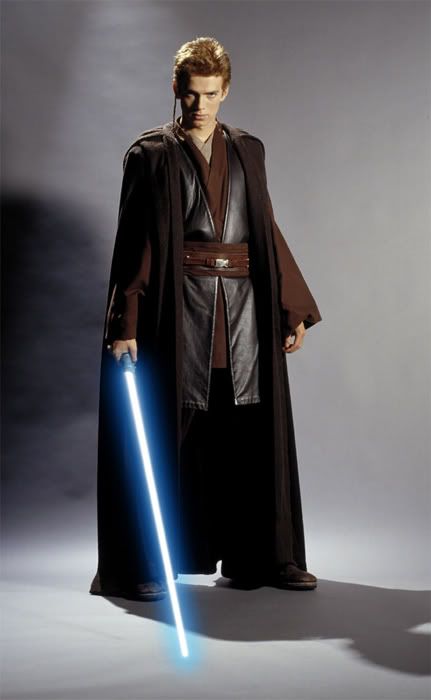
Anakin is told by Obi-Wan to "take a deep breath". Already, Anakin is being transformed into Darth Vader due to his love for Padme. He cannot breath because of her. Later, literally, he will not be able to breathe because of her. He will be trapped in an iron lung suit, "more machine than man". Anakin visually already resembles his future self as Darth Vader. He wears a long cloak that he pulls around him, obscuring his human frame. His voice also resembles that of Vader. The child that Anakin once was no longer exists after ten years of having the strict and stifling Jedi Code shoved down his throat. He is arrogant and angry, bitter at being told to control himself, to deny the self. He is a whiny, rebellious, hormonal teenager, desperate to be recognized for his abilities and to be given power over his own life, and also, desperately in love.
And that has no place in this world. Whenever Anakin shows emotion, everyone around him squirms uncomfortably. They are too used to denying their own emotions, too used to living in the formalities of courtly manners, masking their real identities and feelings for their sake of their positions and the jobs they play in this world. In reflection of this, Anakin is forever frustrated by being told to think before acting. In other words, he is told not to "trust [his] feelings", to hold back on the immense power that he wields. Anakin does not desire to learn control nor to deny his powers. By embracing his power fully, by refusing to stop himself, by following his emotions and feelings, Anakin will fall.
The characters cling to titles (referring to each other by these--"Master", "Padawan", "Jedi", "Senator", "M'Lady"), rather than by name. They deny their self, their humanity, for the sake of their jobs. Padme and Anakin have to disguise themselves as refugees, as everyday people, shedding their roles and titles in order to travel. Only in this disguise are Anakin and Padme able to grow closer, to talk frankly about emotion and feelings, to ultimately fall in love. But in shedding the thing that holds them back from their true identity, they will lose their humanity and identities. Without their jobs, without their moral codes, without the power to do good, they will lose their hearts, their love, and their humanity.
"Well, if droids could think, there'd be none of us here, would there."
Obi-Wan, obviously, does not like droids. Later, he will say that wonderful line: "He's more machine now than man, twisted and evil." Yes, Anakin Skywalker, the thinking droid. The machine that will wipe out everyone. To be machine is to be not human. This is a complete absence of the Living Force. It is ironic [16] that Obi-Wan, particularly in comparison to his apprentice, is a cog in a machine. He will become General Kenobi, little more than the Clone Troopers he orders, or the droid army he battles.
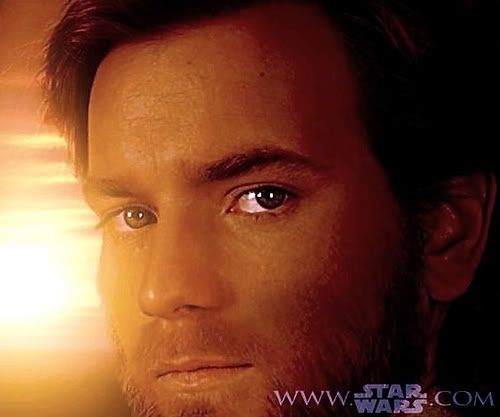
"Why do I get the feeling you're going to be the death of me?"
"You're the closest thing I have to a father."
"Obi-wan is a great mentor. He's as wise as Master Yoda and as powerful as Master Windu."
Obi-Wan Kenobi is now the Master. Though he's certainly not the elitist, snobbish student we saw before, he is still the responsible teacher, arguing constantly with his difficult student. Still, he clings to the Code over emotion. Though there is obvious tension in their relationship, there is also affection. Obi-Wan serves as the white-clad angel on Anakin's shoulder, the voice of his conscience. Anakin refers to Obi-Wan as being like a father to him, but he is ready to grow up, to become a father himself.
Obi-Wan's plotlines follows that of a film noir. It begins with a political mystery (who's trying to kill the Senator?) and reveals a greater conspiracy, deep into the underworld of this galaxy. This fascinating unraveling mystery, and its greater political and sociological implications are brilliantly complex. As a solitary Jedi on a journey, Obi-Wan mirrors his future nephew, Luke Skywalker. Like Luke Skywalker, Obi-Wan is forced to redefine his world, as well as his own moral code and identity. His world is on the brink of collapse: both politically and morally. This reflects the psychological collapse that Obi-Wan shortly will face. Like a film noir hero, he lives in a shadowy world of moral ambiguity, and strives desperately to cling to his own moral code. Though he will succeed in this, Obi-Wan will tragically fall.
After losing his mother, Anakin learns that his Jedi "father" is in danger. After his fall and failure, Anakin clings to the Code, clings to his rationale mind after his abandon to emotion. Padme [17], on the other hand, gets in touch with her humanity and her heart as she falls in love with Anakin. She decides not to do the safe thing, but to do as Anakin's heart would: go rescue Obi-Wan. Thus, Anakin's second moral dilemma is resolved. He is able to both follow the Code and his heart.
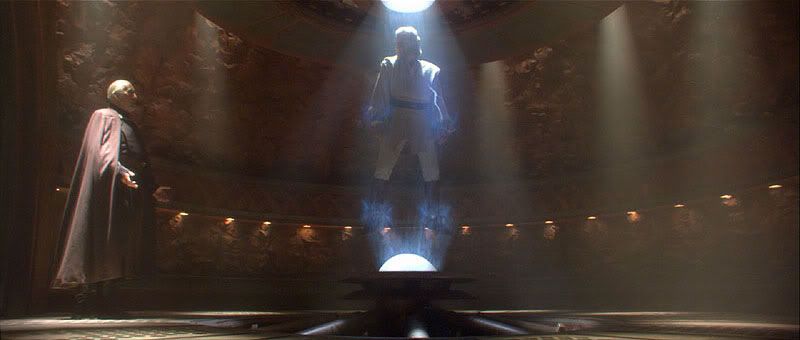
Obi-Wan hangs suspended when captured by Dooku, who questions him, revealing how deeply the lines of morality are being blurred. Obi-Wan's fate is hanging, almost like a puppet, helpless to change his future or fate. His fate is literally up in the air. Later, Obi-Wan will be chained in the arena, forced to watch as his apprentice rules his destiny. So, in Attack of the Clones, Obi-Wan falls out of a window, is dragged and hung over an abyss after kicking someone over it, is suspended in chains, and finally, is chased in an arena. All are symbolic of his fate and his tragic hero arch.
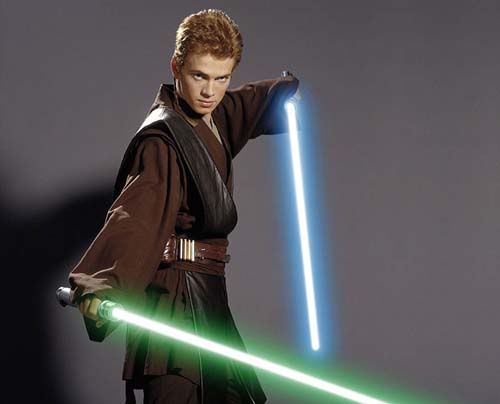
The Death Star makes its first appearance. In the fog of battle--in the circular nature of this Civil War, a war between complex dualities-- it is an appropriate appearance for a spherical death machine. Anakin and Padme have fallen and failed, and then Anakin and Obi-Wan fall and fail in their battle against Dooku. In becoming closer to Padme, in being fueled by emotion and anger and a desire for revenge, Anakin is breaking his relationships with the two people that most guard his duality. Anakin fights Dooku with two lightsabers, and he cannot handle both of them, and loses his arm. He cannot balance between two extremes, and therefore loses both.
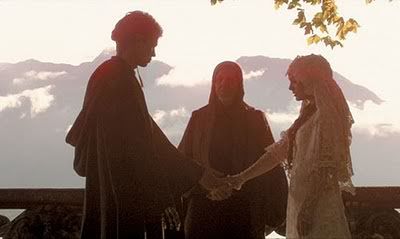
The sun sets blazing over the Republic, as it visually--with scores of Troopers and ships--turns into the Empire. Meanwhile, Anakin and Padme are married at this, the beginning of the end. Duality is resolved between them: the male and the female, the titled job and the human identity, the head and the heart. But we know that this marriage will end just as horrifically as this war. In fact, just as the Republic will lose this war by winning, this marriage will also lose by winning. By being a secret, the marriage between Padme and Anakin will tear apart their very souls. Padme holds Anakin's mechanical hand, embracing the monstrous side of him, his inhumanity due to his inability to control his emotions. And this will be her, and the galaxy's, undoing.
"Victory you say? Master Obi-Wan, not victory. The shroud of the Dark Side has fallen."
[1] Whether to follow the Jedi code of living without connections, but to be ruled by the rationale mind, or, to follow the code of human life: to love and be loved, to be ruled by one's heart.
[2] Between Anakin Skywalker and Darth Vader.
[3] The allegory to American history, one of my most favorite periods of American history, is easy to make. The Separatists are the South, full of greedy businessmen breaking moral codes (such as slavery) for their own gain, and using the plights of poor farmers for their own gain. The Republic, holding high ideals (such as abolition), have distinct moral flaws and hypocrisy of their own.
[4] Coruscant is also viewed upside down at the beginning, and Padme lands in fog, showing that this world is obscured and confused, that things are flipping upside down, changing, warping.
[5] After all, he didn't secret Luke away, and drill him on lightsaber techniques for nineteen years. Anakin may not have felt loved by his Master, but obviously Obi-Wan learned a few things from his beloved student. Though Anakin turned out so terribly, Obi-Wan obviously appreciated his strengths: being a human being with emotional attachments.
[6] Fire always being a symbol of Anakin's emotional state and freedom, his power, and his future destruction due to his inability and lack of a desire to control his heart. Fire is emotion and passion unrestrained, and also, in a literal sense, the very thing that destroys his humanity.
[7] As well as their inability to find moral balances, which, of course, is exactly what results in their ultimate falls.
[8] Of course, did Obi-Wan have much of a choice? Just as Jango was about to shoot and kill Obi-Wan, Anakin refuses to heed his wise advice to control his own emotions, to think and use his rational mind. As much as Obi-Wan is flawed by his own arrogance and lack of emotion, he is also a good man that does not deserve the fate of the guilt-ridden horrors of his own student destroying the galaxy.
[9] Just as he will use his love of Anakin, the love that will transfer to his son, to redeem Anakin.
[10] Only when Anakin reaches the heights of "heaven" as a redeemed spirit, does Obi-Wan also share this redemption and renewal.
[11] It is ironic that, while Anakin longs for a family, his son will long for adventure. And the loss of Beru and Owen are exactly what will motivate Luke to that adventure and ultimate heroism. This is the natural order of the rising hero. Anakin's own path is such a perversion that it is not surprising that he will become a tragic, fallen hero, ripped of his humanity by the very code that should help him preserve it.
[12] Which, remember, he has been frustratingly told to deny, just like he has been instructed to deny his mother and his emotions.
[13] The lightsaber will eventually be given to Luke Skywalker, who will not only save Anakin's soul and bring him back to his "true self", but also will hold onto the lightsaber as a symbol of his idealized version of his father, the Jedi he wants to emulate. Furthermore, Anakin's lightsaber will be lost forever when Luke loses this idealized father, when Anakin and Darth Vader are first revealed to be one and the same.
[14] Obi-Wan, noteworthily, also loses his lightsaber briefly during his symbolic battle and fall with Jango.
[15] Chopping off limbs in bars since 1977.
[16] Yet, I believe appropriate, as I do believe that Obi-Wan Kenobi is the best Jedi of them all. He has his student's heart, but the Jedi's control. He embraces the Living Force, as well as the Cosmic, the power of the heart, as well as of the mind. In this, he does not like machines, flying, or droids, but rather living people and creatures.
[17] Similar to how Anakin has brought out the humanity in Obi-Wan.